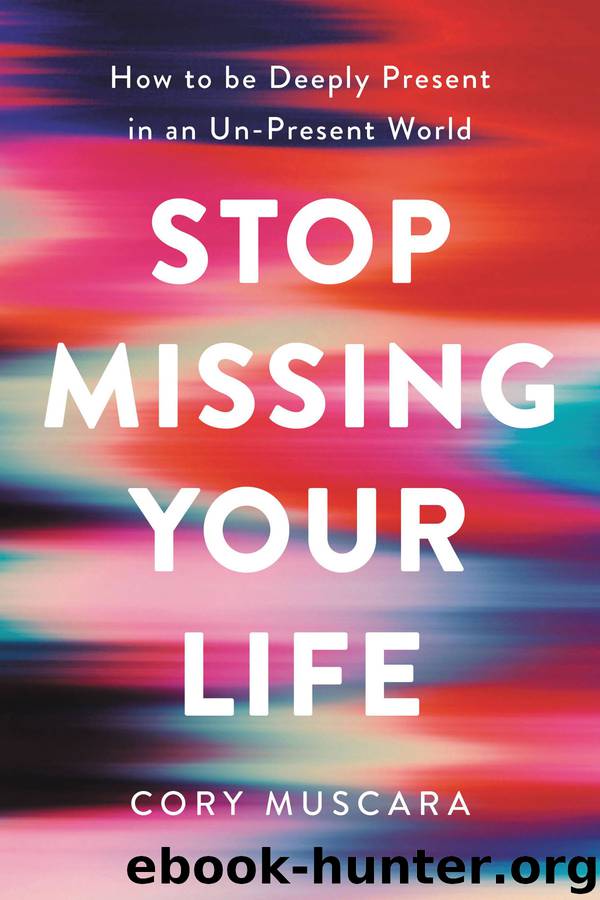Stop Missing Your Life: How to Be Deeply Present in an Un-Present World by Cory Muscara

Author:Cory Muscara
Language: eng
Format: mobi
Tags: self help
ISBN: 0738285293
Publisher: Hachette Books
Published: 2019-12-31T05:00:00+00:00
YOUR MIND WANTS YOU TO BE HAPPY
Have you ever had the experience of eating a particular food that you loved, but then got sick from it? Like, throwing up, head-in-toilet sick? What happened to your relationship with that food afterward? You can’t stand the thought of it, right?
Wisdom works the same way. When we finally see the pain associated with our usual way of doing something, it’s like getting sick from the thing we previously thought made us happy, and we no longer feel pulled to it.
This is because your mind wants you to be happy. It’s not trying to make you suffer. It just needs your help understanding what happiness is.
It may seem ridiculous to need to help your mind understand how to be happy. Shouldn’t it be obvious? you might think. But we have to remember that we evolved to believe that ultimate happiness meant surviving, which translated to avoiding pain and getting pleasure. So, when we’re caught up in agitation and stress, even though we might think, “I hate being like this,” another part of our brain is thinking, “We need to be like this; it keeps all the pieces of our life together! If things falls apart, we fall apart!” The pain of the anxiety is less than the pain we associate with what would happen if we weren’t anxious.
Much of the time we try to combat this by saying, “Stop worrying! Relax! Be positive!” but that’s just like telling yourself, “Don’t eat the cheesecake; you’ll be happier!” We know it to be true on one level, but the primal drive to eat the cake is greater than our rational mind.
That’s why, instead of saying, “Stop worrying! Relax! Be positive!” we need to bring more curiosity to moments of anxiety, and more curiosity to moments of peace (even if they’re seldom). Only then can the mind see “Oh, when I’m peaceful, things don’t fall apart as much as I think they will; and when I’m anxious, it actually feels really uncomfortable and doesn’t seem to provide me that much benefit.”
The more clearly our mind sees how its usual patterns are creating unnecessary suffering, the more inclined it will be to reconsider and recondition those patterns.
Here’s another example:
When walking around the monastery in Burma, I wore a pair of Ray-Ban aviators to protect my eyes from the tropical sun. Back home when I wear these, this look is a dime a dozen. In a Burmese monastery, however, I looked like I was from Hollywood.
The locals who tended the gardens and cleaned the buildings would stare, point, and smile at me as I walked by. I didn’t wear the aviators for that reason, but I’d be lying if I said my ego didn’t like the attention.
This was a predicament for me. Part of the Buddhist path (and most meditative and spiritual paths, for that matter) is about freeing yourself from your ego. The teachings state that when we’re identified with our ego, it makes us feel smaller, less connected, less loving, and more stressed.
Download
This site does not store any files on its server. We only index and link to content provided by other sites. Please contact the content providers to delete copyright contents if any and email us, we'll remove relevant links or contents immediately.
Periodization Training for Sports by Tudor Bompa(8253)
Bodyweight Strength Training by Jay Cardiello(7908)
Born to Run: by Christopher McDougall(7120)
Inner Engineering: A Yogi's Guide to Joy by Sadhguru(6785)
Asking the Right Questions: A Guide to Critical Thinking by M. Neil Browne & Stuart M. Keeley(5757)
The Fat Loss Plan by Joe Wicks(4907)
Bodyweight Strength Training Anatomy by Bret Contreras(4677)
Yoga Anatomy by Kaminoff Leslie(4358)
Dynamic Alignment Through Imagery by Eric Franklin(4208)
Science and Development of Muscle Hypertrophy by Brad Schoenfeld(4127)
Exercise Technique Manual for Resistance Training by National Strength & Conditioning Association(4061)
ACSM's Complete Guide to Fitness & Health by ACSM(4056)
The Four-Pack Revolution by Chael Sonnen & Ryan Parsons(3971)
Bodyweight Strength Training: 12 Weeks to Build Muscle and Burn Fat by Jay Cardiello(3961)
The Ultimate Bodybuilding Cookbook by Kendall Lou Schmidt(3935)
Yoga Anatomy by Leslie Kaminoff & Amy Matthews(3899)
American Kingpin by Nick Bilton(3875)
Nutrition for Sport, Exercise, and Health by Spano Marie & Kruskall Laura & Thomas D. Travis(3774)
Yoga Therapy by Mark Stephens(3742)
